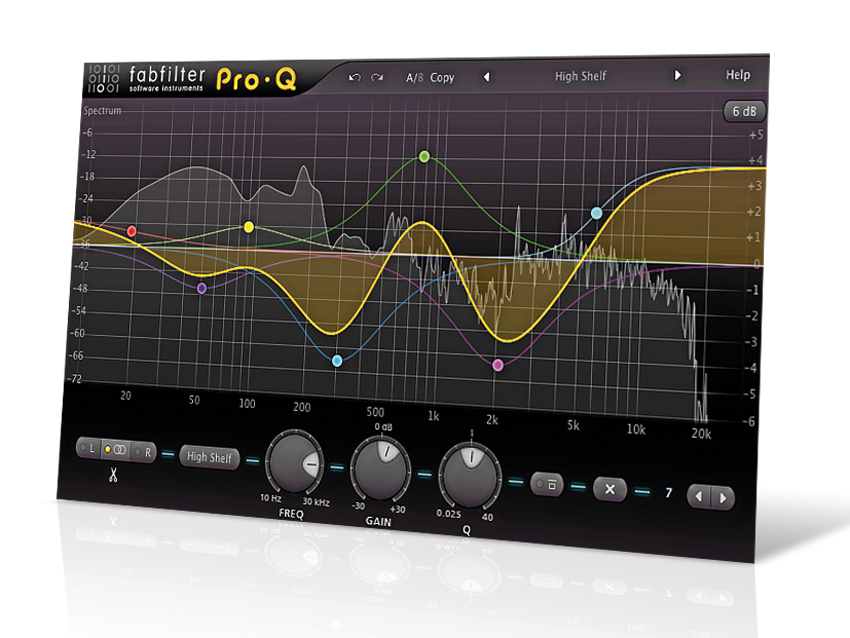MusicRadar Verdict
With its spot-on sound and wonderful interface, Pro-Q is up there with the best EQs money can buy.
Pros
- +
Very clear, ergonomic design. Great sound. Up to 24 bands. Clever stereo and mid/side mode. Linear phase mode with four latencies. Spectrum analyser.
Cons
- -
None.
MusicRadar's got your back
FabFilter has a well-deserved reputation for taking standard concepts and giving them a unique and successful spin. But with consistent praise comes great expectation, so its new EQ plug-in, Pro-Q, already has its work cut out for it.
Previous plug-ins from FabFilter have tended to exhibit their own way of working, which can be a little confusing or off-putting for traditionalists. However, we reckon EQ is one case where it makes sense to go for the fully 'digital' interface - the 'nodes and curves' display is simply more informative and comprehensible than a bunch of dials. From the uncluttered interface and easily legible typefaces to the neat colour contrasts and smooth edges, Pro-Q is visually clear and radiates solid reliability.
Creating a new band is as simple as double-clicking the graph and dragging the resulting point around. And as Pro-Q's helpful tip window tells you while hovering over the dot, holding down the modiier key (Cmnd on Mac) enables you to change the Q setting, too - or you can simply use the mouse wheel. Selecting multiple nodes is done by lassoing or Shift-clicking them - you can then edit the lot at once.
It's all incredibly smooth and effective, with a few rather nifty surprises. For example, when dragging multiple nodes, negative gain values decrease and positive values increase, which is perfect for, say, simultaneously intensifying your settings (accentuating all the peaks and troughs) if you want a more extreme EQ effect.
In detail
Backing up this great interface are numerous features and, while not being particularly sexy, there's pretty much everything you need in a modern EQ. For starters, you get bypass (and delete) buttons per band, a comprehensive preset memory system (with a basic assortment of factory presets to get you started), MIDI learn and program change controls, undo/redo, pre- or post-EQ spectrum analyser and keyboard entry for parameter values.
As for those all-important filter types, each band can be set to bell curve, low shelf, high shelf, low cut or high cut. For the latter two, you can set the steepness to 6, 12, 24 or 48dB per octave. The default processing mode is a standard zero-latency digital affair, but you can switch Pro-Q into linear phase mode, with a choice of four latencies (higher latencies give greater frequency resolution in the bass).
Pro-Q can work in mono, stereo or mid/side modes, and FabFilter's novel implementation is characteristically slick: each node's filter can apply to both or either of the channels. Thus you never have to switch between left and right editing modes - it's all on the same graph. If you've dialled in a working stereo setup, but the left channel needs attention, just drop in a new node, click its 'L' button and tweak away.
Summary
So, who might find a use for Pro-Q? Well, pretty much anyone, we'd say. The range of modes and great sound make it ideal for jobs requiring great fidelity, such as mastering and acoustic instrument processing. With up to 24 bands, though, it can also be a fun and creative tool, plus the zero-latency mode makes it viable for performance-related uses, such as live play, recording or composition. And its awesome interface makes it more practical and effortless to use than pretty much any EQ we've tried.
We've seen a number of great EQ plug-ins recently, including ones that offer either vintage-style sounds, huge power and range, or highly useful interfaces, so if you've already invested in one of our recommendations, you shouldn't feel compelled to spend any more. But if not, and you need a great-sounding EQ with a superb interface, you won't want to miss this gem.
Hear what Pro-Q can do to a loop:
Dry
Gentle master, no linear phase
Gentle master, linear phase
Computer Music magazine is the world’s best selling publication dedicated solely to making great music with your Mac or PC computer. Each issue it brings its lucky readers the best in cutting-edge tutorials, need-to-know, expert software reviews and even all the tools you actually need to make great music today, courtesy of our legendary CM Plugin Suite.
“We were arguing a lot and we were miserable”: How Green Day exceeded expectations with their most ambitious song
"There’s plenty for us guitarists to learn – and ‘less is more’ is the overriding lesson": how to play like George Harrison on The Beatles' Abbey Road
“They didn’t like Prince’s bikini underwear”: Prince’s support sets for the The Rolling Stones in 1981 are remembered as disastrous, but guitarist Dez Dickerson says that the the crowd reaction wasn’t as bad as people think











